The Quirky business that wants to transform inventing
- 7 hours ago
- Business
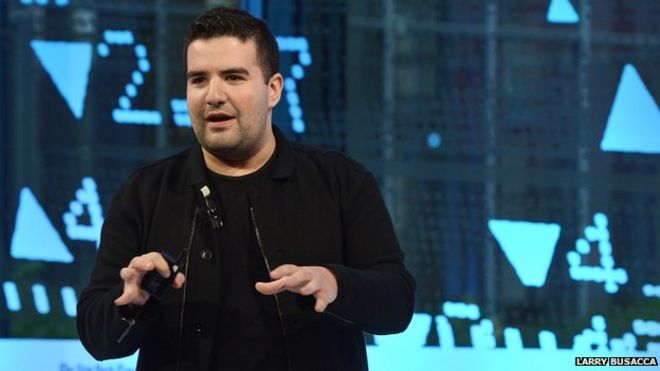
Sometimes a chap becomes a part of the story he's been sent to cover. Recently it happened to me in New York.
For years now, I've been reporting on what people call the great disruption - the way that technology (in particular the internet) keeps bumping into our established way of doing things, and rewriting established ideas.
Electronic commerce, smartphones and smart watches, 3D printing, internet video phones, social messaging, the whole wireless world... each a small part of the wave of change that's confronting the giant companies who've made fortunes based on mass production and 20th Century marketing.
Well, reporting on change is one thing... taking part in it is quite another, as I discovered when I trudged across lower Manhattan a few months ago to visit a company called Quirky.
Quirky by name, quirky by nature, it was founded six years ago by a big and rather bombastic 20-something called Ben Kaufmann.
Mr Kaufman has a forceful personality. While he was still a teenager he persuaded his parents to remortgage their house, raising $185,000 (£120,000) so he could produce and market a product he'd devised... a disguised earphone for his music player so that he could listen in class without the teacher noticing.
He must have been a horrid student.
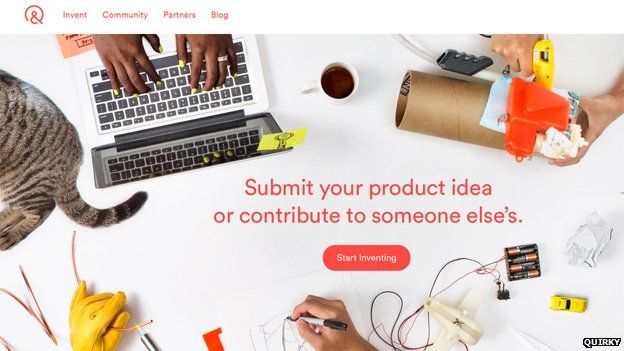
The company made money, but Mr Kaufman grew restless. And then he hit on the idea of Quirky - a group of specialists who would take over the financing, production and management of other people's ideas... and bring those with most potential to the marketplace, in return for the bulk of the revenue.
So, 95% of revenues go to Quirky, with the inventor sharing his or her 5% with the dozens of other collaborators who work on the project over the internet - thinking up a name, choosing styling and colours.
One early idea was from another teenager - a set of electrical sockets laid out so that they could bend and flex... an elegant and convenient way of plugging in an array of gadgets without the plugs getting in the way of each other.
Like a TV show
The company, which has attracted $185m of funding from well-known venture capital investors, says it's now brought several hundred products to the marketplace.
And it's gone into partnership with the giant US corporation General Electric to speed up innovation there. Quirky's office in Manhattan buzzes with clever people ramping up ideas at warp speed.
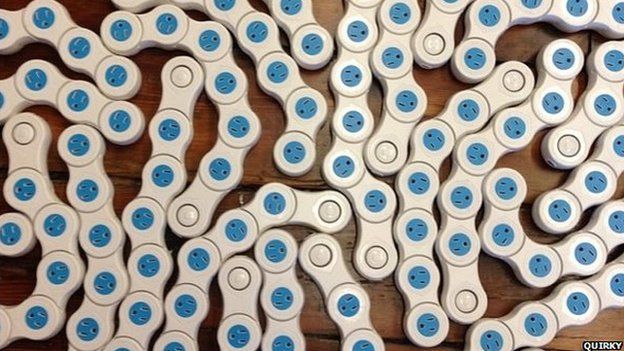
The heartbeat of Quirky is the evaluation session, known as "eval". It takes place at 7pm almost every Thursday, and that's where I came in. It's beamed live over the internet, a sort of TV game show.
A handful of the four thousand ideas pitched at the company every week make it to eval. Mr Kaufman hosts the show, advocates on the staff give a brief pitch, and then come the instant reactions: from a panel of insiders and guests.
The studio audience joins in, Quirky followers contribute instant social network comments, and after five minutes or so of debate, a show of hands by the studio audience decides the fate of the idea. Pretty brutal.
I was invited to be a panellist. With some trepidation, I agreed.
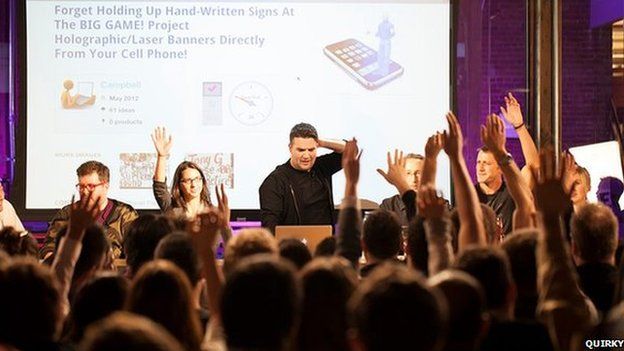
When we got under way, this token Englishman was mildly enthusiastic about the cat litter dispenser that signalled to the store when refills were needed.
I was keen on the gadget that signalled when your home water supply sprung a leak. It wasn't just me: those two were voted suitable for Quirky development.
And I agreed with the "community" vote that turned down five other ideas, in particular the proposal for a heated dog lead to keep the owner's hands cosy on winter walks. America the pampered, I said.
With two new darling grandchildren, I did warm to the idea of the teddy bear phone that absent parents could use to speak to their children, but I had to admit that it was a bit creepy. Another "no" from the audience.
Bang on 8pm, Ben Kaufman closed the show. My moment of innovation glory was over.
Disruptive model
If all this sounds weird, it is - a 28-year-old running a company like a circus ringmaster, picking suitable real products for sale in real stores on a show of hands in a Manhattan loft every Thursday.
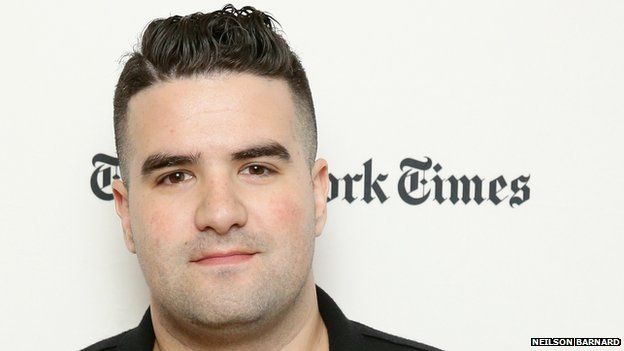
And Quirky is having a tough time. It is burning through its investors' money, and is looking for more outside investment. It has been laying some of those enthusiastic staffers off. It's cut the range of products it will get involved with.
And it has decided to get other companies to manufacture the things it works on... becoming a middleman operation.
But Quirky is still getting attention because it is a very disruptive business model.
It is markedly different from the laborious way innovation normally works in conventional companies. At Quirky, ordinary people's brainwaves are given a chance to thrive.
And I must say it was jolly interesting to be allowed to be, just for once, a little bit disruptive.
- The economist with 'deviant thoughts'
- A Tale of Several Cities
- The curious case of low unemployment
- Ellen MacArthur's circular economy
- Why stock market crashes happen in the autumn
- The business of cathedrals
- The rise of new economies
- Heating buildings using computers
- Why Vanity Fair covers business stories
- How Dundee became a games centre
- Celebrating the joy of craftsmanship
- The 30-year-old health billionaire
- How mobile phones became fashion items
- The importance of being a 'normal'
- Should we fear intelligent robots?
- How to conduct your staff
- Carphone Warehouse and the art of innovation
- How Poundland got its inspiration
- How GDP became the figure to watch
- Yorkshire's cutting edge technology
- Let's think about ideas
- Is new tech just a fashion item?
- The difficult art of a good brainstorm
- Unlikely front line in war on cybercrime
- Wise words from an (almost) unknown guru
- Should we fear the growth of Huawei?
- The complicated art of retail logistics
- Smashing way to start a global business
- A train trip through the UK's industrial past
- The art of selling luxury goods
- The designer creating a new Chinese brand
- Lessons from online learning

No comments:
Post a Comment
Please leave a comment-- or suggestions, particularly of topics and places you'd like to see covered